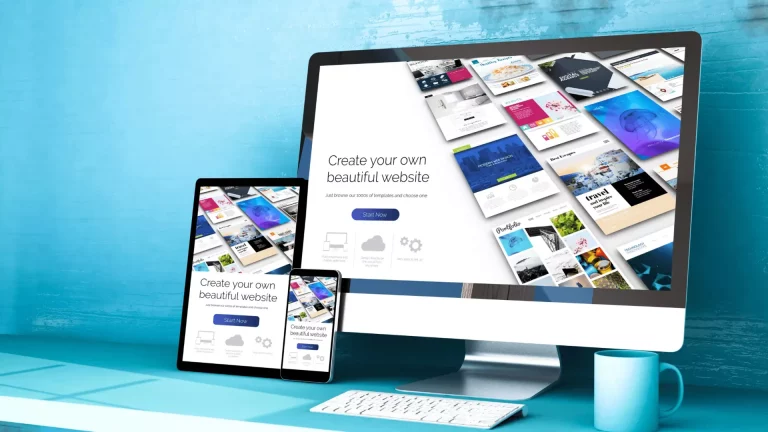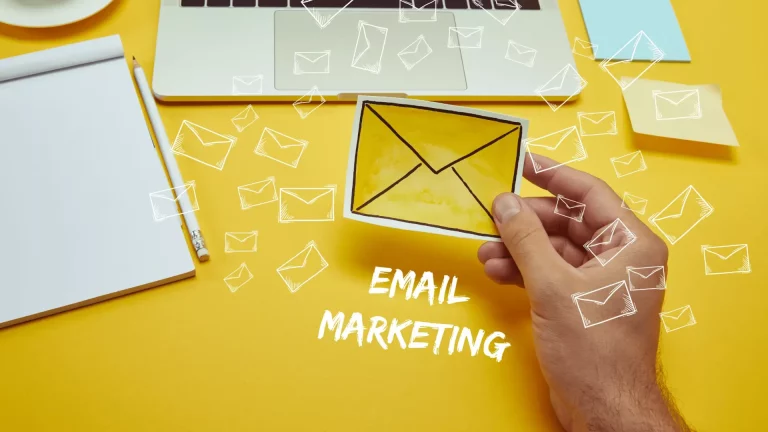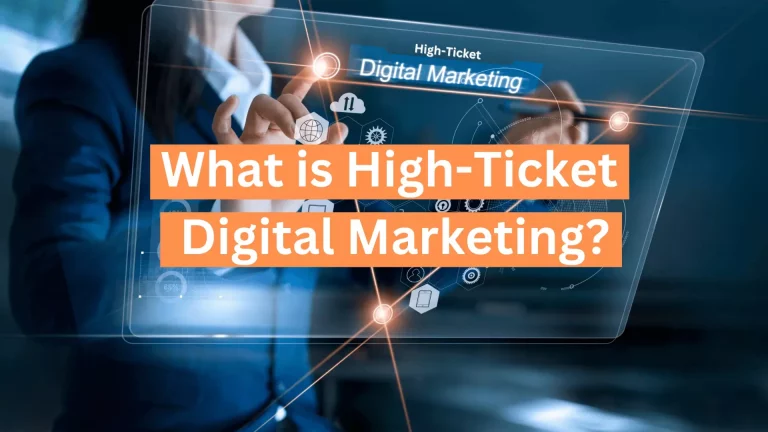Digital marketing is a must for small businesses. If you are a small business owner and want to grow your business, digital marketing is the right way. However, understanding the digital marketing environment can be challenging, especially with limited resources. In this blog, I will share customized digital marketing tips for small businesses.
You’ll be able to optimize your online presence, connect with your audience effectively, and grow your business using these strategies. And they’ll all be within your budget.
Here’s your step-by-step guide to success in the modern age, whether you’re new to digital marketing or looking to refine your current approach.
What is digital marketing?
In this digital world, to grow a business, there is just one secret recipe: digital marketing. A company can showcase its products and services to all over the world using digital marketing strategies.
In short, digital marketing is using both the internet and electronic devices to promote products or services. Digital marketing requires targeting specific products for specific audiences. This marketing involves website optimization, search engine rankings, high-quality content, and social media platforms.
The importance of digital marketing for small businesses
From my point of view, Digital marketing has become very essential for any business. Nowadays people like to buy products or services online because it is less time-consuming. As for small businesses, it is one of the cheapest ways to reach many people worldwide.
In addition, it helps small businesses to reach and talk to the right customers. You can create a survey that is either useful for your customer or will benefit you in understanding your business.
In digital marketing, you can talk to your customers directly using social media and email. You can give your customers more information about your business and make them loyal customers. Also, it helps make your business known and trusted online. It’s like having a unique advantage over your competition.
1. Understanding Your Target Audience with Digital Marketing Tips
For a small business, understanding who their ideal customer is very significant. They are understanding customer behaviors, age, gender, location, and, most importantly, their interest. If you can specify this information, you already know your target audience.
Creating Buyer Personas:
Buyer personas are detailed profiles of your ideal customers. For your marketing profile, you have to give them names, faces, and backgrounds to make them feel real. For example, if you sell fitness products, you might have a buyer persona named “Rocky,” a 30-year-old man passionate about staying fit. As a result of these personas, you can better understand your audience’s interests, pain points, and motivations.
Conducting market research:
Market research means collecting information about your industry, existing competitors, and potential customers. To grow your business digitally, you must know what’s happening in the marketplace. You must know about your competitors’ actions and marketing process.
This is the best way to know what your audience is looking for. Researchers can do this research using surveys, online tools, social media listening, and industry reports.
Understanding your ideal target audience through this process will help you make strategies. Your small business will be able to create both paid and unpaid marketing campaigns with less cost. You must understand your audience’s needs and speak their language to make your marketing efforts more effective.
2. Search Engine Optimization (SEO) – Digital Marketing Tips for Better Visibility
Search engine optimization uses a website to inform search engines about what type of website it is. When a user searches for something, search engines display that website based on their information. SEO mainly works on making your website more visible to your relevant audience.
In SEO, you must research and select the keywords for your targeted audience. As a digital marketer for small businesses, I encourage people to choose long tail keywords, less competition, and less complicated keywords so that they can rank on search engines.
Then, you strategically insert your target keywords into your website’s content, titles, and meta descriptions. This tells search engines that your site is relevant to those specific search queries.
For a small business, SEO is not just all about search engine ranking; it’s about connecting with your business’s targeted audience, which is one of the key benefits of SEO. When your website appears on the first page of search engine results, you’re more likely to get your customers.
As a digital marketer, this is one of the most effective ways of getting organic traffic for small businesses. Organic traffic comes from people actively searching for what you are offering. You can convert them as your potential customers. Plus, you can build your small business recognition in your industry or niche by ranking higher than your competitors.
3. Website Optimization – Improve User Experience
If you run a small business with a website, optimizing your website helps you in many ways. It shows more people when customers search for your business online. If your website is well-designed and works well, it makes your business seem trustworthy and professional.
With website optimization, you can ensure your business website reaches the right customers. Your website should work well on phones (Mobile responsive) because many people use phones to browse online.
As a digital marketer, I realize how significant website optimization is because voice search works like asking Siri or Alexa for information. So, website optimization is a superpower for small businesses in today’s digital world.
4. Search Engine Marketing (SEM) – Immediate Visibility
In short, in digital marketing, search engine marketing (SEM) is an easy and powerful technique for small businesses. SEM and paid advertising offer immediate visibility on search engine results pages (SERPs). It drives valuable traffic to websites while allowing tight control over costs.
In SEM, you can target specific audiences for your small business based on demographics, location, interests, and keywords. This way, you can ensure that your small business advertising campaigns reach the most relevant customers.
5. Social Media Marketing – Engaging with Your Audience
Social media is one of the most essential and powerful tools for digital marketing for small businesses. A small business just using social media can grow a business. You can run paid and unpaid ads on social media.
As a small business, you can easily target your ideal customer. But for mass engagement, you must develop a content strategy that includes images, videos, and informative content with original, engaging content.
For growing your business, consistency in posting is critical to maintaining your audience’s interest and trust. Engaging with your followers is equally essential, so reply quickly to comments and messages to maintain a sense of connection.
6. Affiliate Marketing – Promoting Your Business Through Others
For a small business, affiliate marketing is one of the best ways to promote a business. The first step to maximizing its potential is identifying affiliates within your niche. Small companies must cultivate strong relationships with affiliates to gain trust and collaboration. You can Offer competitive commission rates to encourage affiliates to promote your products or services.
For affiliates who are supplied with high-quality promotional materials they can effectively represent your brand.
Creating and managing an affiliate marketing campaign requires a structured approach as a digital marketer. You can use clearly defined terms and conditions to control commission, payment schedules, and promotional guidelines. In that way, you can ensure transparency and smooth collaboration.
In addition, keep communication channels open with affiliates so you can address concerns promptly. It can help small businesses expand their reach, reach new customers, and boost their bottom line by leveraging affiliate marketing.
7. Google My Business Account Marketing – Local Visibility
For your small business to maximize Google My Business potential, creating and optimizing your business profile with accurate information is necessary. This includes an address, phone number, service time location etc.
In order to build trust and credibility, you need engaging graphics, like photos and videos. You have to constantly update posts and updates to keep your profile fresh and use Google Insights to track performance.
You can use local search features using Google’s geolocation tools to target local customers. Including relevant keywords and phrases in your profile and website content is important.
Moreover, strategic partnerships with a trusted Digital Marketing Company can enhance your online presence further. They can provide expertise in optimizing your Google My Business account, ensuring that your business stands out in local searches. Collaborating with professionals in the field can amplify your visibility and attract more local customers.
You can encourage your customer engagement through questions and answers by responding to their queries and reviews in a timely manner. Moreover, you can use Google Maps to drive foot traffic to your small business by providing directions and offering location-based promotions. Small businesses can increase their visibility and attract more local customers by using these Google Business Account Marketing strategies.
8. Analytics and Data – Informed Decision-Making
Digital marketing requires data analysis. Using it, small businesses can better understand their marketing efforts, customer behavior, and overall performance. When you analyze data, you can make informed decisions and optimize your marketing strategies based on what’s working and what isn’t.
It is possible to manage data effectively using various tools and techniques. A website analytics platform like Google Analytics can provide extensive insights into a website. As for email marketing platforms, MailChimp provides detailed campaign metrics.
Additionally, A/B testing helps refine strategies, and customer relationship management (CRM) systems simplify customer data management. The digital world requires constant monitoring and adapting.
9. Collaboration with Other Businesses – Expand Your Reach
Collaboration with related businesses can change small businesses. As a result, you can expand your customer reach, reduce marketing costs, and improve your offerings.
You can create profitable partnerships with businesses that share your target audience but aren’t direct competitors. You need to identify potential partners to build a successful collaboration strategy for your small business. Ensure you align your values and goals, establish clear roles and expectations, and formalize your agreements.
10. Customer Relationship Management (CRM) – Enhancing Customer Engagement
It’s essential for small businesses to build strong relationships with their customers through Customer Relationship Management (CRM). To choose the right CRM software, you should consider user-friendliness and cost as a small business owner. Once you have selected the right CRM, you need to implement it so that your customer engagement is enhanced.
The CRM software makes it easier for small business owners to keep track of customer interactions, purchases, and preferences. With this data, you can make each customer feel valuable. In this way, you can understand by customizing your marketing plans.
Customers enjoy customized experiences that adjust to their needs when receiving custom services. Small businesses can build long-term relationships with customers by using CRM tools.
In conclusion, digital marketing is essential for small businesses trying to succeed online. Using various digital marketing strategies, you can cost-effectively connect with customers and drive growth. Continuous data analysis, collaboration, and effective CRM use are crucial for long-term success. You should adopt these strategies and make them a part of your life. Your small business can succeed in the digital age by leveraging new methods of digital marketing.






